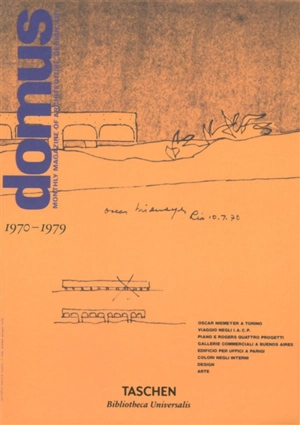
Domus. 1970-1979
Versailles, Lyon 2ᵉ, Lyon 6ᵉ...
Ce que dit l'éditeurThe Rise of Individuality and Ecological Awareness Design and architecture turning points of the 1970s, à la domus Founded in 1928 as a « living diary » by the great Milanese architect and designer Gio Ponti, domus has been hailed as the world's most influential architecture and design journal. With style and rigor, it has reported on the major themes and stylistic movements in industrial, interior, product, and structural design. This fresh reprint of the 1970s domus coverage brings together the most important features from an era marking seismic changes in architecture and design. It was a time when individualism gained momentum as a novel style, and we began to notice the first postmodernist tendencies. Faced with the global energy crisis, architects and designers imbued their methods with a new ecological awareness. For work to be featured in the magazine it had to offer function, spatial clarity, intellectual persuasion, relevant originality, or grace. The groundbreaking projects and practitioners that made the cut include Shiro Kuramata, Verner Panton, Joe Colombo, Richard Meier, the modernist structures by Foster Associates and the Centre Georges Pompidou by Renzo Piano and Richard Rogers. « domus has a rich history
of spotting trends and fashions.
It elevates icons to classics. » |
RésuméFondé par G. Ponti en 1928, le journal d'architecture et de design Domus traite en profondeur des thèmes et évolutions de style. Cette livraison comporte tous les numéros des années 1970, marquées par le règne de l'individualisme, la prise de conscience écologique et des personnalités comme Richard Meier, Renzo Piano et Richard Rogers, Arata Isozaki et Kisho Kurokawa. ©Electre 2024 |
Caractéristiques Éditeur(s) Date de parution
8 novembre 2017
Collection(s)
Bibliotheca universalis
Rayon
Arts décoratifs
Contributeur(s) Charlotte Fiell
(Editeur scientifique (ou intellectuel)), Peter Fiell
(Editeur scientifique (ou intellectuel)), Luigi Spinelli
(Préfacier), Germano Celant
(Auteur du texte), Cesare Maria Casati
(Auteur du texte) EAN
9783836526531
Nombre de pages
787
pages
Reliure
Relié sous jaquette
Dimensions
20.0
cm x
15.0
cm x
4.9
cm
Poids
1368
g
|

